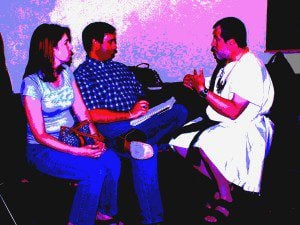 Despite the well-meaning insistence of many, we are not one. Yes, we have much in common with our fellow humans, but a simple look at our religious beliefs and practices, gender and sexual orientations, economic statuses, racial and ethnic backgrounds, political philosophies, and countless other areas show that we are, in fact, quite different.
Despite the well-meaning insistence of many, we are not one. Yes, we have much in common with our fellow humans, but a simple look at our religious beliefs and practices, gender and sexual orientations, economic statuses, racial and ethnic backgrounds, political philosophies, and countless other areas show that we are, in fact, quite different.
This is a good thing. Our differences make us a more robust species and a more robust society. If one way of living and being turns out to be disadvantageous – individually or collectively – there are other options available. The problem, as is painfully obvious, is that we have an innate fear of The Other, which leads to racism, sexism, homophobia, religious discrimination, and other evils.
Conor Davis’ recent post on Polytheist.com describes some of the “social realities” that Pagans and polytheists face because of our religious callings, difficulties that result in some deciding that it’s just not worth it. Here’s an excerpt:
Young people … have been shown to want to be accepted by their group or groups … So, when someone, or someones, in their peer group rejects a very big part of their identity it can be shaking. Or when they outright aren’t given a chance due to being out about their beliefs it can make it hard to be out about their beliefs, which decreases our visibility…
Then you have to stack on that this age group is in their prime dating years and will just begin to enter their careers and you have a very stressful and precarious situation created and often times no social network empathetic enough to get them through these rough times. And then we wonder why most of our young folks have a five year life-span in Pagan and Polytheistic traditions…
Many of the people who leave are simply not receiving the support and tools they need to carry on, and frankly we can’t limit ourselves to people who are capable of being solo troopers… There is an absolute dearth of advice on how to live socially as a polytheist, how to introduce your partner to your religion’s ideas and concepts, or even how to handle basic criticisms and rejections that young folks often have to face.
This is a problem faced by anyone in a vulnerable position, and the young are extremely vulnerable. If you’re rich, if you have unique and marketable skills (think high-profile actors), or if you have powerful connections, you can be as non-conforming as you like and suffer few if any ill effects. Or, conversely, if you have nothing left to lose, nobody much cares if you follow an odd religion.
As people committed to social justice, it’s our job to build a society where differences aren’t a liability. But until then, this is the world we live in, and these are the harsh realities we face.
I have no easy answers. I have no universally helpful advice. I can only tell you what I’ve done myself.
Denying who I am only brought more suffering. I learned this lesson very slowly and thus very painfully. I alternately tried to be who the TV said I was supposed to be and who the fundamentalist church I grew up in said I was supposed to be. Those are two very different things, but neither one resonated with my soul. I couldn’t accept a religion based on things that go against my core values, and I found no satisfaction in pursuing excessive wealth.
When I accepted that it was OK to want what I really wanted, the suffering began to subside.
Tell people what they need to know and no more. I needed to accept who and what I am, but I had no need to shout it to the world. In full disclosure, this came naturally for me. I’ve always been a rather private person (until I get to know you – then I won’t shut up).
Now, it helps that I’m married to someone who’s open-minded and supportive even if she doesn’t share many of my beliefs and practices. Then again, I don’t think I could be married to someone who wasn’t open-minded even if we followed exactly the same religion. I have non-Pagan friends who I’ll talk religion with. There are others I won’t, mainly because they aren’t interested. We’ll talk football or swap travel stories or argue about who has the best barbeque.
I still don’t talk about my religion at work except at the most general levels, but neither does anyone else except a few very aggressive Christians. Yes, I’d prefer to work in a culture that accepted and celebrated everyone’s religion, but in a workplace in Texas that includes Muslims, Hindus, Buddhists, Jews, multiple varieties of Christians, atheists, and at least one polytheistic Pagan Druid, agreeing to not talk about religion is probably the safest course of action.
Learn to navigate the mainstream society. There are some bigots out there, but most folks don’t really care about your religion. Even if privately they think you’re on the fast track to hell, all they really care about is that you show up to work on time, don’t block their driveway, and keep the noise down when they’re trying to sleep. Those aren’t unreasonable requests.
Even if you find the mainstream culture’s values lacking – I certainly do, that’s one of the reasons I keep this blog – it’s helpful to be able to work within the system. Cara Schulz, a Hellenist, ran for city council last year and narrowly lost (which almost all first-time candidates do when running against incumbents), setting herself up well for future campaigns. I don’t agree with all of Cara’s politics, but a city council with her on it would be far more tolerant and accepting of non-mainstream religions.
Nimue Brown has a very good post on her blog titled Druidry and Diplomacy. She’s mainly talking about diplomacy within a religious community, but her advice is valid in this context as well. Nimue says:
Diplomacy is not tacit support of wrong things. It’s not appeasement, or taking the easy option. Diplomacy is not refusal to challenge or peace at all costs, but it is a quest for the smoothest, gentlest and at the same time most effective way through issues of conflict.
Come out as you can. I started this blog in 2008 under a pseudonym. In the early days I focused as much on Unitarian Universalism as I did on Paganism, even though I didn’t feel exactly right about it. I started making myself easier to find, then a co-worker recognized me from a public appearance and the world didn’t end. Two years ago I realized I had to replace compartmentalization with integration, and I did.
I’m as out as I can be and still be my diplomatic self. It’s gone well, but I did it at my own pace. It’s better for me this way, and it makes it easier for those who come after me.
I’ve lost exactly zero friends and family members because of my religion, though I think this says more about my friends and family than it does about me. Now, I don’t insist on leading the pre-dinner prayer at family gatherings with an invocation to Danu, but I don’t lie to people either.
Retain your sovereignty. This approach has worked for me and it’s worked for many others. But what if a God tells you to take a bold public stand and to do it now?
You have the right to say no. You have the right to say “not yet” or to negotiate for a more manageable arrangement. Then again, you may not want to say no.
I’m not so naïve as to say the Gods won’t put you into something you can’t handle, because sometimes They do. I can say They’re rarely wasteful, and if you have the combination of skill and devotion They need then They are likely to give you what you need to accomplish what They set before you. But that’s not likely to include your comfort.
Bargain with your eyes wide open and your heart and your brain fully engaged.
As people of good will, we work and pray for the day when telling someone you’re Pagan causes no more trouble than telling them you’re from Ohio. Not because it makes no difference that some people are Pagan and some are Christian and some are atheist, but because we will have learned to respect and honor our differences.
Until then, religious non-conformance will remain a challenge best met with honest diplomacy.
















